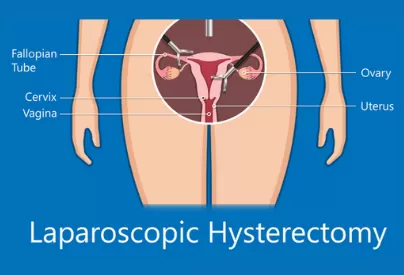Laparoscopic hysterectomy is performed for various medical reasons, including:
- Uterine Fibroids: Removal of the uterus (hysterectomy) is a common treatment for large or symptomatic uterine fibroids that cause heavy menstrual bleeding, pelvic pain, and pressure.
- Endometriosis: In cases of severe endometriosis, where tissue similar to the uterine lining grows outside the uterus, hysterectomy may be recommended to alleviate pain and symptoms.
- Heavy or Prolonged Menstrual Bleeding: Chronic and heavy menstrual bleeding that does not respond to other treatments can be a reason for hysterectomy.
- Uterine Prolapse: When the uterus descends into the vaginal canal due to weakened pelvic floor muscles (uterine prolapse), hysterectomy may be necessary for treatment.
- Adenomyosis: A condition in which the uterine lining grows into the muscular wall of the uterus, causing pain and heavy bleeding.
- Gynecological Cancers: Hysterectomy is a primary treatment for various gynecological cancers, including uterine, ovarian, and cervical cancers, depending on the stage and type of cancer.
- Chronic Pelvic Pain: In some cases of unexplained or severe chronic pelvic pain, hysterectomy may be considered after other treatment options have been explored.
- Recurrent Pelvic Infections: For women with recurrent pelvic infections that do not respond to other treatments, removing the uterus may be a therapeutic option.
- Family Planning: Women who have completed their family planning and wish to have a permanent form of contraception may opt for hysterectomy.
- Gender-Affirming Surgery: In gender-affirming procedures, hysterectomy is performed as part of the process of transitioning from female to male.
The specific reason for performing a laparoscopic hysterectomy can vary from patient to patient, and the decision is made based on the individual’s medical condition, symptoms, and healthcare provider’s recommendations. Laparoscopic hysterectomy is favored for its minimally invasive approach, which typically results in smaller incisions, reduced pain, and quicker recovery compared to traditional open surgery.
For more information, Consult, Dr. Deepika Doshi, on of the best Gynecologist in Mira Road, practicing at Dhanvantari Hospital.




